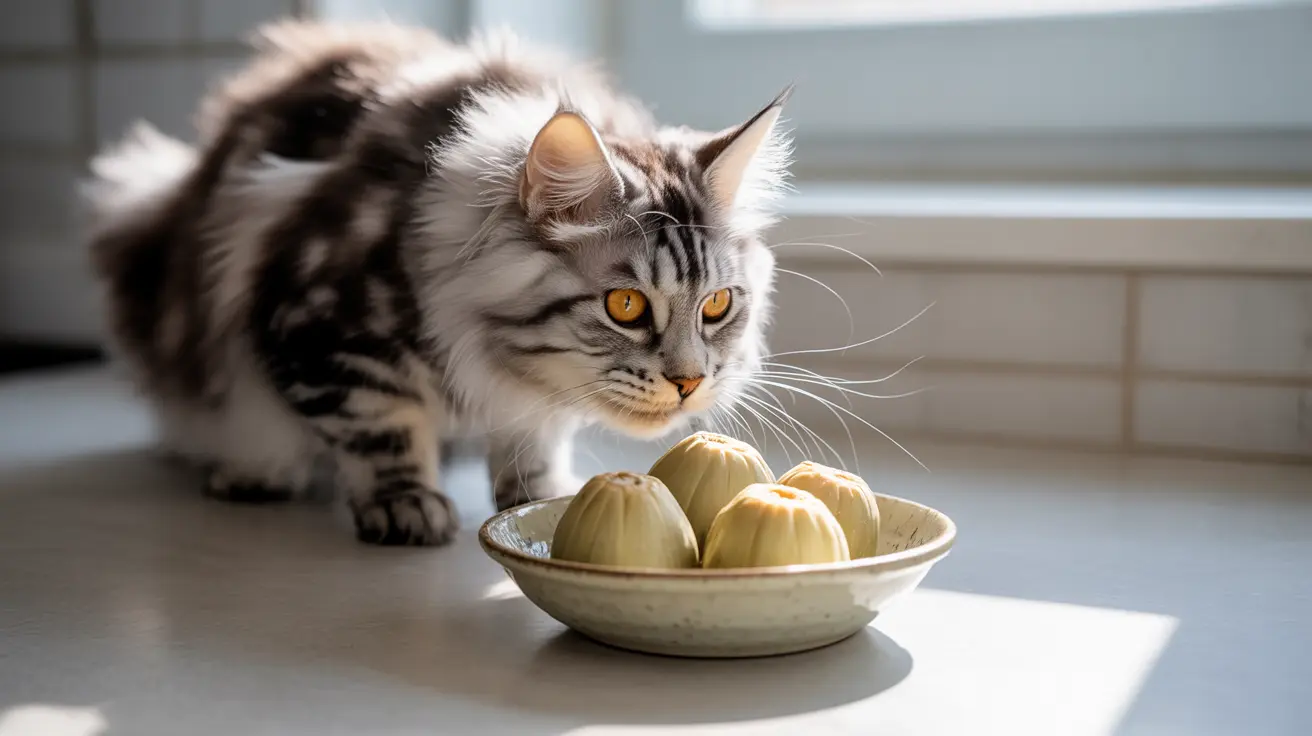Understanding Cats' Nutritional Needs
Before diving into artichokes specifically, it's crucial to understand that cats are obligate carnivores. This means their bodies are designed to derive nutrition primarily from meat sources. Unlike humans, cats' digestive systems aren't equipped to process plant matter efficiently.
While some vegetables can be safe for cats in small amounts, they don't provide significant nutritional benefits and should never replace proper cat food in their diet.
Safety of Artichokes for Cats
Plain, properly cooked artichokes are not toxic to cats. However, this doesn't automatically make them a recommended food choice. The safety of artichokes for cats depends largely on how they're prepared and served.
Safe Preparation Methods
If you decide to offer your cat artichoke, follow these guidelines:
- Cook thoroughly (steamed or boiled)
- Serve plain without any seasonings
- Remove tough outer leaves
- Cut into very small, manageable pieces
- Only offer the tender heart portion
What to Avoid
Never feed your cat:
- Raw artichokes
- Marinated or canned artichokes
- Artichokes prepared with oils, butter, or seasonings
- Tough outer leaves that could pose a choking hazard
Potential Risks and Concerns
While artichokes aren't toxic, they can cause several problems for cats:
Digestive Issues
The high fiber content can lead to:
- Stomach upset
- Diarrhea
- Vomiting
- Abdominal discomfort
Physical Hazards
Improperly prepared artichokes may cause:
- Choking risks
- Intestinal blockage
- Difficulty swallowing
Nutritional Value for Cats
While artichokes are nutritious for humans, cats gain minimal benefit from them. Their digestive systems aren't designed to extract nutrients from plant matter effectively. Any potential benefits from vitamins or minerals would be better obtained through proper cat food or meat-based sources.
When to Contact Your Veterinarian
Monitor your cat closely if they've eaten artichoke, especially if it was seasoned or prepared with other ingredients. Contact your vet immediately if you notice:
- Persistent vomiting or diarrhea
- Signs of choking or difficulty breathing
- Lethargy or unusual behavior
- Loss of appetite
- Abdominal pain or discomfort
Frequently Asked Questions
Can cats safely eat artichokes, and if so, how should they be prepared?
Cats can safely eat small amounts of plain, cooked artichoke heart. The artichoke should be thoroughly cooked, unseasoned, and cut into tiny, manageable pieces. Never serve raw or seasoned artichokes.
What are the potential health risks for cats if they eat too much artichoke?
Excessive artichoke consumption can cause digestive upset, including vomiting, diarrhea, and abdominal discomfort. The tough parts can also pose choking hazards or cause intestinal blockages.
Do artichokes provide any nutritional benefits to cats?
Artichokes provide minimal to no nutritional benefits for cats. As obligate carnivores, cats obtain their necessary nutrients from meat-based sources rather than vegetables.
Which parts of the artichoke are safe or unsafe for cats to consume?
Only the tender, cooked heart of the artichoke is safe for cats to consume in small amounts. The tough outer leaves, raw portions, and any seasoned parts are unsafe and should be avoided.
What symptoms should I watch for if my cat eats artichokes or accidentally consumes seasoned or canned artichokes?
Watch for signs of digestive upset (vomiting, diarrhea), difficulty breathing, lethargy, loss of appetite, or abdominal pain. If your cat consumed seasoned or canned artichokes, contact your veterinarian for guidance.
Conclusion
While cats can technically eat plain, cooked artichokes in very small amounts, there's no compelling reason to include them in your cat's diet. Instead, focus on providing a balanced, meat-based diet that meets all your cat's nutritional needs. If you're considering adding any new foods to your cat's diet, always consult with your veterinarian first.






